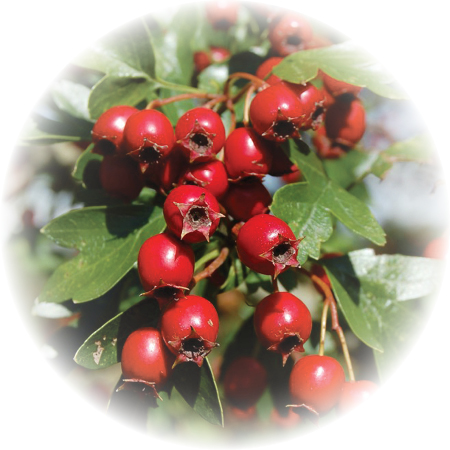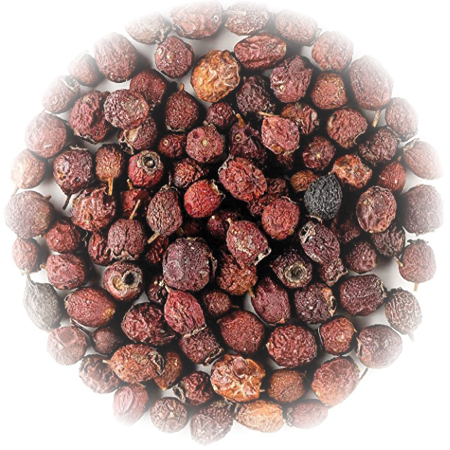Hawthorn Berries, Whole (Crataegus laevigata) – Dried Herb, Organic
$10.69 – $106.90
Hawthorn, also called Thornapple, White Thorn or May Tree, is a thorny deciduous shrub or small tree in the Rose family (Rosaceae), which includes Raspberry, Blackberries, Wild Rose and many fruit trees such as apples, pears and apricots. Crataegus, is derived from the Greek kratos, meaning “strength” because of the strength of the wood and akis “sharp”, referring to the thorns of some species.
Hawthorn has stems and a trunk that consist of hardwood and gray bark, often having tri-lobed leaves and white or pink flowers that are similar to other genera in the Rosaceae family. In several countries in Europe, especially Germany, the Hawthorn was used as a hedgerow; “haw” being an older term for hedge. Hawthorn exhibits leaves in early spring, flowers in May and bears bright red berries in September. There are around 280 known species of Hawthorn, the most common of the species is Crataegus monogyna, C. oxyacantha and C. laevigata. All Hawthorn species have wellness benefits and herbalists use them in similar ways to Traditional Chinese Medicine. English Hawthorn or Crataegus monogyna is native to the northern temperate forests of Europe, North Africa and West Asia and has become widely naturalized in the North America and Australia in the 1800s.
Used for ceremonial and spiritual purposes Hawthorn was believed to uplift and strengthen both the physical and emotional heart. Herbalist Matthew Becker suggests that Hawthorn is specifically helpful for women with “broken hearts”. I.e. for those “feeling wounded and hurt”. Hawthorn is a pagan symbol of fertility and renewal and has ancient associations with May Day. It was the ancestor of the Maypole and its leaves and flowers the source of May Day garlands; as well as appearing in the wreath of the “green man”. Hawthorn was considered sacred tree medicine to the ancient Druids, and was said to house fairies, specifically when growing with oak and ash trees.
Hawthorn has a long history in herbal medicine, with some accounts going back as far as the first century in Rome where it was also viewed as a symbol of both love and marriage. Chinese, Native Americans and European peoples have a longstanding relationship with hawthorn as a heart tonic. Hawthorn has been used in jams, jellies, candies, wines and cordials. In Europe, all parts of the tree were used: the leaves and blossoms were used as a heart tonic and a diuretic; the berries and leaves were made into an astringent tea to soothe the throat. The wood was carved into smaller objects such as boxes and combs and burnt as fuel for fires. In Traditional Chinese Medicine, Hawthorn was used for digestion because and it supported the spleen, stomach and liver meridians. The berry is full of vitamin C and flavonoids, making it high in anti-oxidants and the leaves and flowers have been said to provide a calming effect on the nervous system.
Properties:
The taste and energetics of Hawthorn Berries are slightly sweet and sour, cooling and moistening. Hawthorn Berries have an affinity to the heat, circulatory system, immune system, digestive system, liver, spleen, nervous system, kidneys and respiratory system. For a heart and blood tonic combine Hawthorn Berries with Rosehips, Rooibos or Hibiscus. (Note: This blend may not be good for people with low blood pressure.) For a respiratory tea combine with Red Clover, Horehound, Mullein Leaf or Wild Cherry Bark.
How to use:
Prepare a decoction by simmering 1 teaspoon of Hawthorn berries in 1 cup of water for 15-20 minutes, drink up to three times daily or steep in a thermos overnight.
Cautions & contraindications:
If you are taking beta blockers or other cardiac medications you should consult with an experienced practitioner or primary care physician, before taking Hawthorn. People with congestive heart failure are advised not to take Hawthorn.
This information is for educational purposes only and is not intended to diagnose, treat or cure any disease or illness. Please consult your healthcare provider prior to the use of this product if you are pregnant, nursing, taking medications or have a medical condition. Individual results may vary.


Reviews
There are no reviews yet.